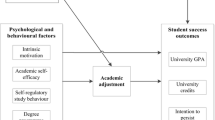Abstract
This study examined the nature of strategic planning practices and their performance effects in 285 cooperative education programs in U.S. institutions of higher education. Consistent with the results of previous research in for-profit firms, involvement in strategic planning was associated with positive performance outcomes on some criteria but not others. Additionally, an examination of performance effects using Porter's (1980) typology indicated that different strategies were associated with different program outcomes.
Similar content being viewed by others
References
Ansoff, H. I., Avner, J., Brandenburg, R. G., Portner, F. E., and Radosevich, R. (1970). Does planning pay? The effect of planning on success of acquisition in American firms.Long Range Planning 3(2): 2–7.
Backoff, R. W., and Levine, C. H. (1983). Comparing public and private organizations, in J. L. Perry and K. L. Kramer (eds.),Public Management. Palo Alto, CA: Mayfield Publishers.
Bracker, J. S., and Pearson, J. N. (1986). Planning and financial performance of small, mature firms.Strategic Management Journal 7: 503–522.
Buller, P. F., and Stull, W. A. (1987). Strategic planning for the cooperative education practitioner.Journal of Cooperative Education 23: 16–24.
Business Week (September 17, 1984). The new breed of strategic planner, pp. 62–68.
Carper, W. B. (1983). The strategic management of hospitals: A review of the literature and suggestions for the future. In D. F. Ray (ed.),Applying Systematic Knowledge to Problems of Organization and Management. Atlanta: Southern Management Association.
Cope, R. G. (1987).Opportunity from Strength: Strategic Planning Clarified with Case Examples. Washington, DC: Association for the Study of Higher Education.
Dess, G. G., and Davis, D. S. (1984). Porter's (1980) generic strategies as determinants of strategic group membership and organizational performance.Academy of Management Journal 27: 467–488.
Frederickson, J. W. (1984). The comprehensiveness of strategic decision processes: Extension, observations, future directions.Academy of Management Journal 27: 445–466.
Frederickson, J. W., and Mitchell, T. R. (1984). Strategic decision processes: Comprehensiveness and performance in an industry with an unstable environment.Academy of Management Journal 27: 399–423.
Fulmer, R. M., and Rue, L. W. (1974). The practice and profitability of long range planning.Managerial Planning 22: 1–7.
Glueck, W. F. (1980).Business Policy and Strategic Management 3rd ed. New York: McGraw-Hill.
Hambrick, D. C. (1983). Some tests of the effectiveness and functional attributes of Miles and Snow's strategic types.Academy of Management Journal 26: 5–26.
Herold, D. M. (1972). Long range planning and organizational performance: A cross validation study.Academy of Management Journal 14: 91–102.
Hosmer, L. T. Academic Strategy: The formulation and implementation of purpose at three new graduate schools of administration. Doctoral dissertation, Harvard Business School, June 1972.
Karger, D. W., and Malik, Z. A. (1975). Long range planning and organizational performance.Long Range Planning 8: 60–64.
Keller, G.Academic strategy: The management revolution in American higher education, 1983, The Johns Hopkins University Press.
Kiechel, W. (December 27, 1982). Corporate strategists under fire.Fortune, pp. 34–39.
Nielson, R. P., and Porter, R. C. (1981). Strategic planning, consensus building, and optimal satisficing in developing larger scale cooperative education.Journal of Cooperative Education 17: 23–33.
Pearce, J. S. II, Robbins, D. K., and Robinson, R. B., Jr. (1987). The impact of grand strategy and planning formality on financial performance.Strategic Management Journal 8: 125–134.
Porter, M. E. (1980).Competitive Strategy: Techniques for Analyzing Industries and Competitors. New York: The Free Press.
Porter, M. E. (1985).Competitive Advantage. New York: The Free Press.
Rhyne, L. C. (1986). The relationship of strategic planning to financial performance.Strategic Management Journal 7: 423–436.
Rumelt, R. P. (1974).Strategy, Structure, and Economic Performance. Boston: Harvard University Press.
Shrader, C. B., Taylor, L., and Dalton, D. R. (1984). Strategic planning and organizational performance: A critical appraisal.Journal of Management 10: 149–171.
Shrivastava, P. (1987). Rigor and practical usefulness of research in strategic management.Strategic Management Journal 8: pp. 77–92.
Snow, C. C., and Hrebiniak, L. G. (1980). Strategy, distinctive competence, and organizational performance.Administrative Science Quarterly 25: 317–336.
Thune, S. S., and House, R. J. (1970). Where long-range planning pays off: Findings of a survey of formal and informal planners.Business Horizons 13: 81–87.
Todd, P. F. (1984). Strategic planning and cooperative education: A review.Journal of Cooperative Education 21: 11–17.
Waterman, R. H., Peters, T. J., and Phillips, J. R. (1980). Structure is not organization.Business Horizons 23: 14–26.
Welch, J. B. (1984). Strategic planning could improve your share price.Long Range Planning 17: 144–147.
White, R. E. (1986). Generic business strategies, organizational context and performance: An empirical investigation.Strategic Management Journal 7: 217–231.
Wortman, M. S., Jr. (1979). Strategic management: Not-for-profit organizations. In D. E. Schendel and C. W. Hofer (eds.),Strategic Management. Boston: Little, Brown, pp. 353–381.
Author information
Authors and Affiliations
Rights and permissions
About this article
Cite this article
Buller, P.F., Stull, W.A. Strategy and performance in cooperative education programs. Res High Educ 31, 257–270 (1990). https://doi.org/10.1007/BF00992311
Received:
Issue Date:
DOI: https://doi.org/10.1007/BF00992311




